Amazon keyword research tools are used to help sellers find the right keywords to use in their product listings.
By using the right keywords, sellers can improve their chances of ranking high in Amazon search results and getting more sales.
Let’s have a look at a list of the best Amazon keyword research tools that can help boost your product visibility and sales.
Top Amazon keyword research tools to maximize your product visibility
Ahrefs
Ahrefs offers an Amazon research tool that provides valuable assistance to sellers.
Ahrefs empowers sellers on Amazon to boost sales, visibility, and outperform competitors with product research, analysis, optimization, and valuable data.
Pros:
- Comprehensive SEO analysis tools for keyword research, backlink analysis, content analysis, and site audits.
- Large and up-to-date database for accurate and relevant data.
- Powerful keyword research capabilities with valuable metrics.
- Advanced backlink analysis and monitoring features.
Cons
- Higher pricing compared to some competitors.
- The steep learning curve for new users.
- Limited keyword tracking compared to dedicated rank tracking tools.
- The user interface can be overwhelming or complex for some users.

Semrush:
Semrush is a well-known SEO tool that offers a dedicated keyword research tool specifically designed for Amazon.
This feature allows users to conduct in-depth research on keywords relevant to Amazon, aiding in optimizing product listings and improving search rankings.
Semrush is highly regarded in the industry and renowned for its extensive range of features and capabilities, making it a popular choice among marketers and Amazon sellers alike.
Pros:
- Offers comprehensive SEO features, including competitor analysis and organic search insights.
- Provides valuable Amazon-specific keyword research data, tracking rankings and discovering profitable keywords.
- User-friendly interface with intuitive reports and visualizations.
- Allows users to monitor and track the performance of their keyword strategy over time.
- Provides historical data and trend analysis for more informed decision-making.
Cons:
- Pricing plans can be expensive, especially for small-scale sellers.
- Some users may require time to learn and navigate through the tool effectively.

SellerApp:
SellerApp is a comprehensive tool that serves as a valuable resource for sellers, offering support across a wide range of tasks, including essential keyword research.
Renowned for its popularity and high adoption rate, SellerApp has earned its reputation by providing an extensive suite of features and functionalities that cater to the diverse needs of sellers.
With its robust toolkit, SellerApp empowers users to conduct thorough keyword research, enabling them to optimize their listings, enhance visibility, and drive sales on various e-commerce platforms.
Pros:
- Offers a comprehensive suite of Amazon seller tools, including robust keyword research features.
- Provides detailed analytics, competitor analysis, and recommendations for listing optimization.
- Helps sellers identify profitable keywords and track their performance over time.
- Offers insights into product trends and customer behavior.
- Provides guidance for PPC campaigns and sponsored product ads.
Cons:
- The user interface may appear overwhelming initially, especially for novice users.
- The advanced features may be more suitable for experienced Amazon sellers.
- Pricing plans may not be affordable for sellers on a tight budget.

DataHawk:
DataHawk is a robust tool that serves as a valuable resource for sellers, providing assistance across a multitude of tasks, ranging from essential keyword research to comprehensive competitor analysis.
Renowned for its popularity and widespread adoption, DataHawk has gained recognition by offering a diverse array of features and functionalities, catering to the diverse needs of sellers.
With its comprehensive toolkit, DataHawk empowers users to conduct in-depth keyword research, enabling them to uncover valuable insights, optimize their listings, and gain a competitive edge in the market.
Additionally, the tool facilitates thorough competitor analysis, equipping sellers with crucial information to refine their strategies and outperform their rivals.
Pros:
- Provides real-time Amazon analytics and keyword tracking.
- Offers in-depth insights into search volumes, trends, and competitor analysis.
- Helps sellers discover profitable keywords and optimize their Amazon listings.
- User-friendly interface with customizable dashboards and reports.
- Provides data-driven insights for better decision-making.
Cons:
- Pricing plans may be more suitable for larger businesses or sellers with higher budgets.
- Some users have reported occasional data inaccuracies.
- Limited customer support options.

Keyword Tool:
Keyword Tool is an advantageous option for sellers operating on a tight budget, as it offers a complimentary keyword research tool with a foundational set of features.
Despite being a free tool, it delivers valuable insights for sellers looking to optimize their listings and enhance their keyword strategy.
With Keyword Tool, budget-conscious sellers can access essential keyword research functionalities without compromising on quality or breaking the bank.
Pros:
- Offers keyword suggestions for Amazon, Google, YouTube, and other platforms.
- Provides long-tail keyword ideas and search volume estimates.
- User-friendly interface with simple and straightforward functionality.
- It helps sellers identify relevant and less competitive keywords.
- Offers keyword data in multiple languages for global Amazon markets.
Cons:
- The free version has limitations, and access to advanced features requires a paid subscription.
- Limited competitor analysis and in-depth data insights compared to specialized Amazon tools.
- May lack some advanced features found in other comprehensive keyword research tools.

Ubersuggest:
Ubersuggest is a cost-effective keyword research tool that provides a fundamental range of features without any charges.
It serves as a favorable choice for sellers with budget constraints, offering them a valuable resource for conducting keyword research.
Despite being a free tool, Ubersuggest delivers essential insights and functionalities to optimize listings and enhance keyword strategies, making it a reliable option for sellers seeking budget-friendly solutions.
Pros:
- Provides a wide range of keyword suggestions and related terms.
- Offers competitive analysis and domain overview features.
- Includes backlink data for SEO analysis.
- Provides search volume and CPC (Cost Per Click) data for keywords.
Cons:
- Limited functionality in the free version.
- Some data may not be as accurate or reliable as other tools.
- Interface and user experience could be improved.
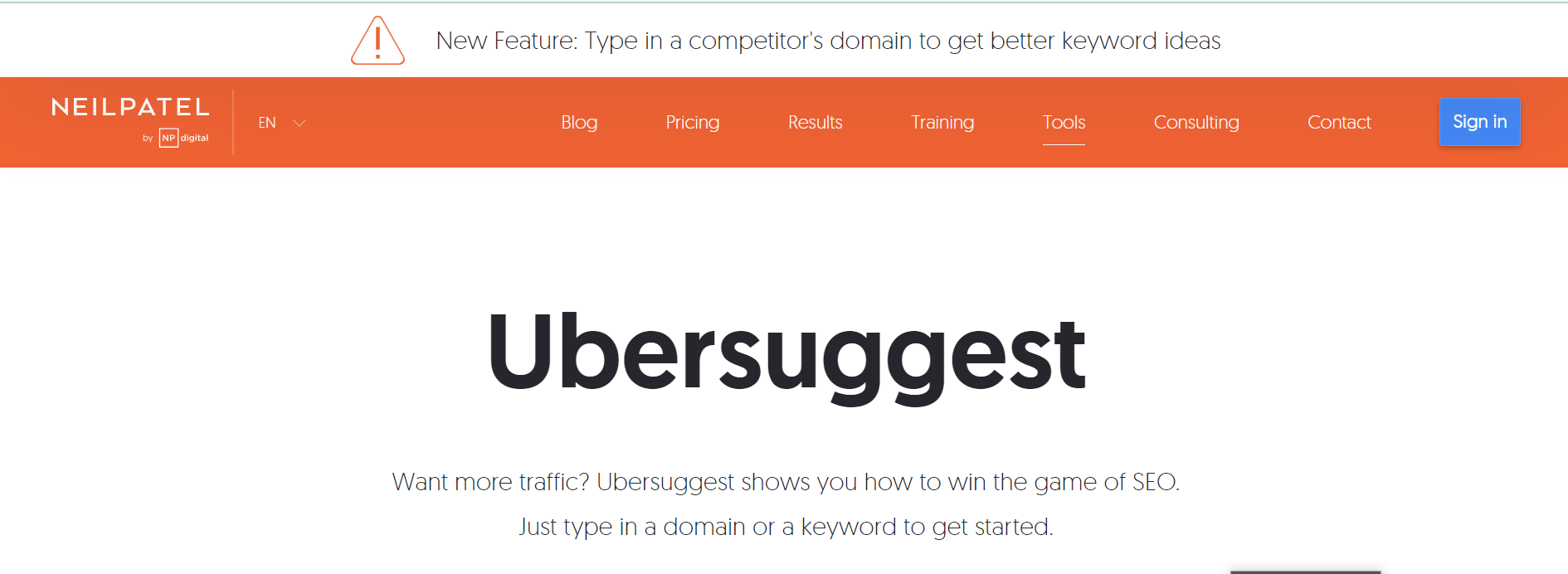
Google Keyword Planner:
Google Keyword Planner is a complimentary keyword research tool provided directly by Google.
It presents an advantageous choice for sellers who are new to the concept of keyword research.
As a beginner-friendly tool, Google Keyword Planner assists sellers in gaining insights into relevant keywords, allowing them to refine their strategies and improve their visibility in search results.
Pros:
- Provides keyword ideas based on actual search data from Google.
- Offers historical statistics and trends for keywords.
- Integrates seamlessly with other Google Ads tools.
Cons:
- Designed primarily for advertisers, so it may lack certain features for SEO research.
- Limited access to specific search volume data (only ranges are provided).
- Competition data can be vague and less detailed.
AnswerThePublic:
AnswerThePublic is an invaluable keyword research tool that offers valuable insights into the questions and queries people have about your product.
It is available for free, making it an excellent choice for sellers who aim to understand their customers’ needs and preferences.
By utilizing AnswerThePublic, sellers can gain a comprehensive understanding of the specific information customers are seeking, enabling them to align their marketing strategies and product offerings accordingly.
This tool helps sellers uncover the crucial customer insights necessary for optimizing their listings, creating engaging content, and ultimately delivering a customer-centric experience.
Pros:
- Generates a wide variety of keyword ideas based on questions, prepositions, comparisons, and more.
- Visualizes keyword data in a visually appealing and interactive format.
- Helps understand the intent and queries of users.
- Offers a free version with limited functionality.
Cons:
- May not provide as extensive keyword suggestions compared to other tools.
- Limited access to search volume and competition data.
- Lack of advanced filtering and sorting options.

Long Tail Pro:
Long Tail Pro is a premium keyword research tool that provides an extensive range of features and functionalities.
It serves as a valuable choice for sellers who are specifically looking to discover long-tail keywords.
By investing in Long Tail Pro, sellers can unlock a wealth of opportunities to identify and target less competitive, more niche-specific keywords.
This tool empowers sellers to refine their keyword strategy, optimize their listings, and enhance their visibility in search results, ultimately catering to the needs of their target audience more effectively.
Pros:
- Specializes in finding long-tail keywords with low competition.
- Provides detailed keyword metrics like search volume, competitiveness, and potential traffic.
- Offers keyword difficulty analysis to gauge the ranking difficulty for specific keywords.
- Includes rank tracking features.
Cons:
- Requires a subscription and is not available for free.
- The interface may be overwhelming for beginners.
- Some users have reported occasional data inaccuracies.

Keyword Tool Dominator:
Keyword Tool Dominator is a comprehensive paid keyword research tool that encompasses a wide array of features and capabilities.
It stands as an excellent choice for sellers seeking to uncover long-tail keywords.
By utilizing Keyword Tool Dominator, sellers can delve into an extensive range of long-tail keyword options, enabling them to tap into niche markets and target specific customer preferences.
This tool empowers sellers to enhance their keyword strategy, optimize their listings, and ultimately gain a competitive edge by capitalizing on long-tail keywords that align with their products and target audience.
Pros:
- Generates keyword suggestions from various sources, including Google, Amazon, YouTube, Bing, and more.
- Offers search volume, CPC, and competition data for keywords.
- Provides autocomplete and related keyword suggestions.
- Supports multiple languages and regions.
Cons:
- Some features are limited to the paid version.
- May not have as extensive data or as many advanced features as other tools.
- The user interface could be more intuitive.
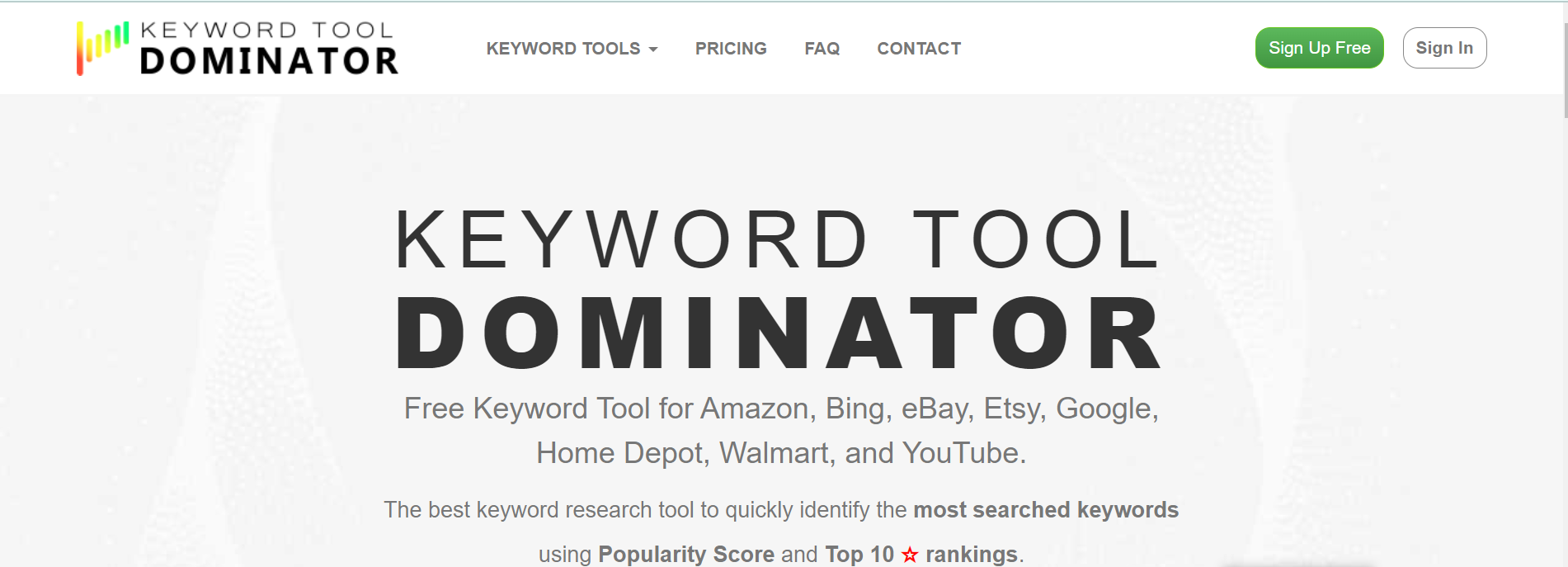
Moz Keyword Explorer:
Moz Keyword Explorer is a comprehensive and paid keyword research tool that boasts an impressive range of features and functionalities.
It emerges as an optimal choice for sellers desiring to unearth long-tail keywords.
By leveraging the capabilities of Moz Keyword Explorer, sellers can delve deep into a wealth of long-tail keyword possibilities.
This empowers them to effectively target niche markets, align their offerings with specific customer preferences, and gain a competitive advantage.
With Moz Keyword Explorer, sellers can enhance their keyword strategy, optimize their listings, and maximize their visibility in search results by tapping into the potential of long-tail keywords.
Pros:
- Provides comprehensive keyword research data, including search volume, difficulty, and opportunity metrics.
- Offers in-depth SERP analysis to understand the ranking landscape for specific keywords.
- Includes features like keyword lists and tracking.
- Integrates with other Moz tools for broader SEO analysis.
Cons:
- More suitable for advanced users and SEO professionals.
- The cost of the tool may be prohibitive for some users.
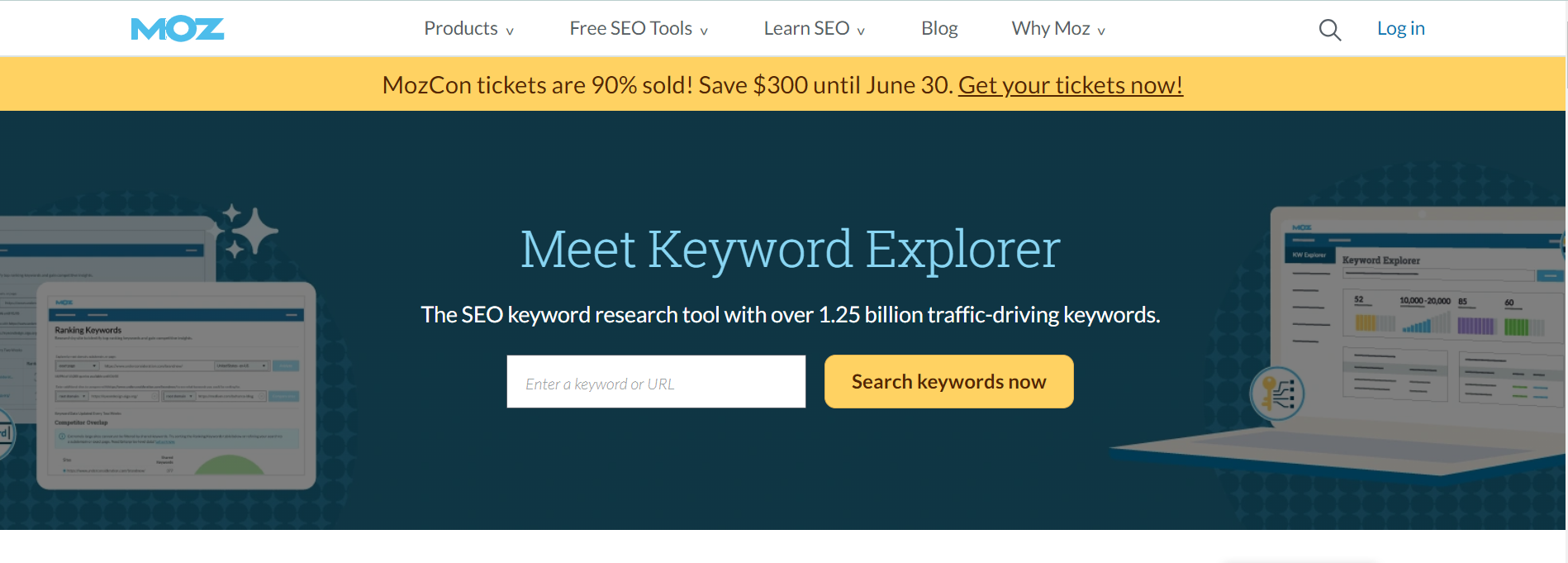
KWFinder:
KWFinder, an advanced and premium keyword research tool available for a fee, presents an impressive repertoire of diverse and comprehensive features.
Its vast array of functionalities makes it a highly advantageous and desirable solution for sellers specifically interested in unearthing and identifying long-tail keywords.
KWFinder helps sellers improve their keyword strategies to reach specific audiences, optimize content, and increase online visibility.
Pros:
- Provides accurate search volume, CPC, competition, and trend data.
- Offers additional features like SERP analysis, keyword lists, and rank tracking.
- User-friendly interface and intuitive user experience.
Cons:
- Some advanced features may be lacking compared to other tools.
- Limited to keyword research and may not have other SEO functionalities available in comprehensive suites.
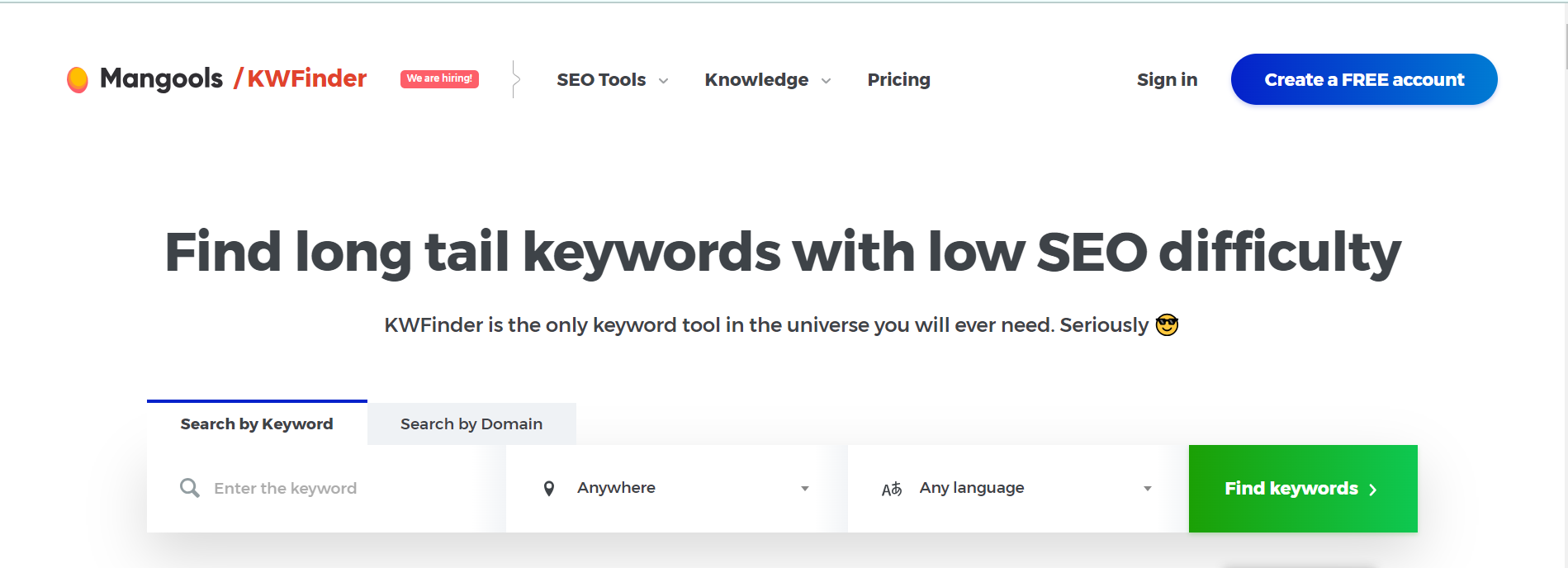
Jungle Scout:
Jungle Scout is a popular all-in-one Amazon research tool that offers features for product research, competitor analysis, and keyword research.
It provides data on estimated sales, revenue, competition, and trends.
The keyword research feature helps sellers identify relevant keywords, search volumes, and related keywords to optimize their listings and PPC campaigns.
Pros:
- Comprehensive data on product sales, rankings, and trends.
- User-friendly interface.
- Powerful product research capabilities.
- Chrome extension for real-time research on Amazon.
Cons:
- Relatively high pricing.
- Primarily focused on Amazon marketplace.
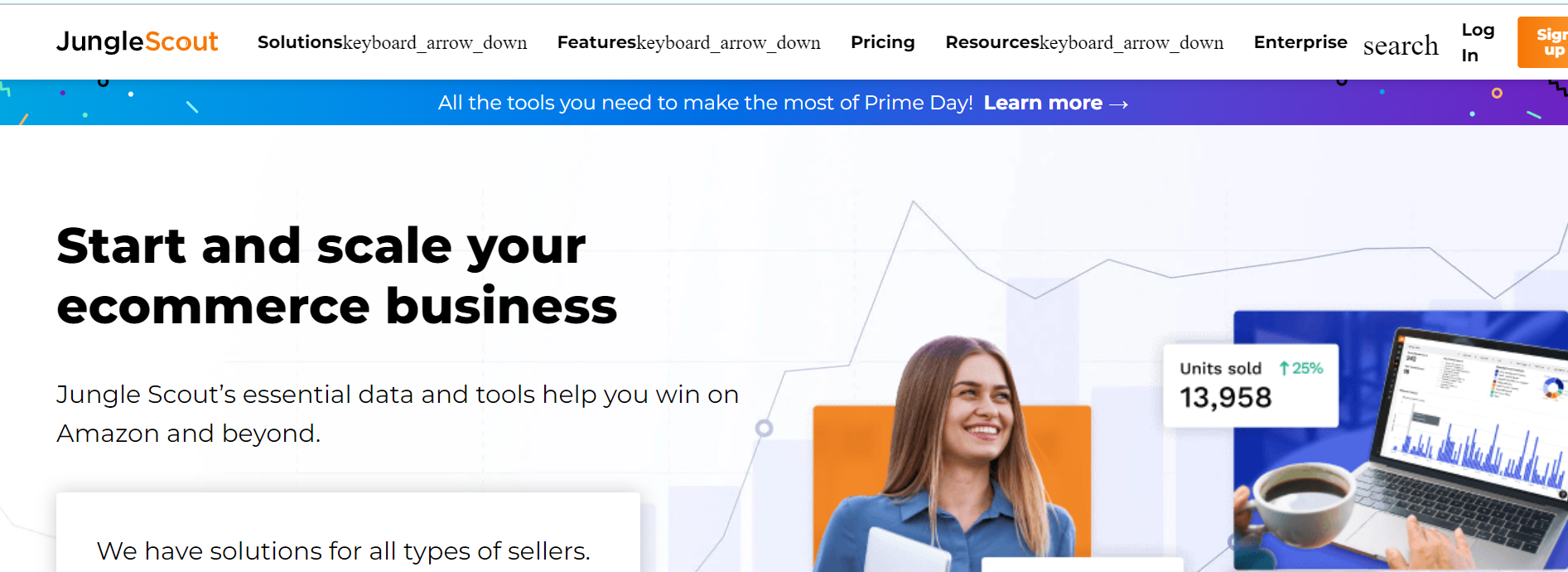
Helium 10:
Helium 10 is a comprehensive set of tools specifically crafted to cater to the needs of Amazon sellers.
It includes a powerful keyword research tool called Cerebro, which provides search volume, competition, and profitability data for keywords.
Helium 10 also offers features for product research, listing optimization, inventory management, and more.
Pros:
- A comprehensive suite of tools for various Amazon seller needs.
- Accurate product data and historical trends.
- Extensive keyword research capabilities.
- Training and educational resources.
Cons:
- Learning curve for new users.
- Higher pricing for some sellers.
AMZScout:
AMZScout is an all-in-one Amazon seller tool that includes a keyword research feature.
It provides search volume, competition, and trending data for keywords, helping sellers identify high-demand keywords for their products.
AMZScout also offers product research, sales estimation, and listing optimization features.
Pros:
- Provides product data, sales estimates, and profit calculations.
- Chrome extension for on-site research.
- Niche and keyword research tools.
Cons:
- Limited features compared to some other tools.
- Pricing might be relatively high.
- Some users may find the interface overwhelming.
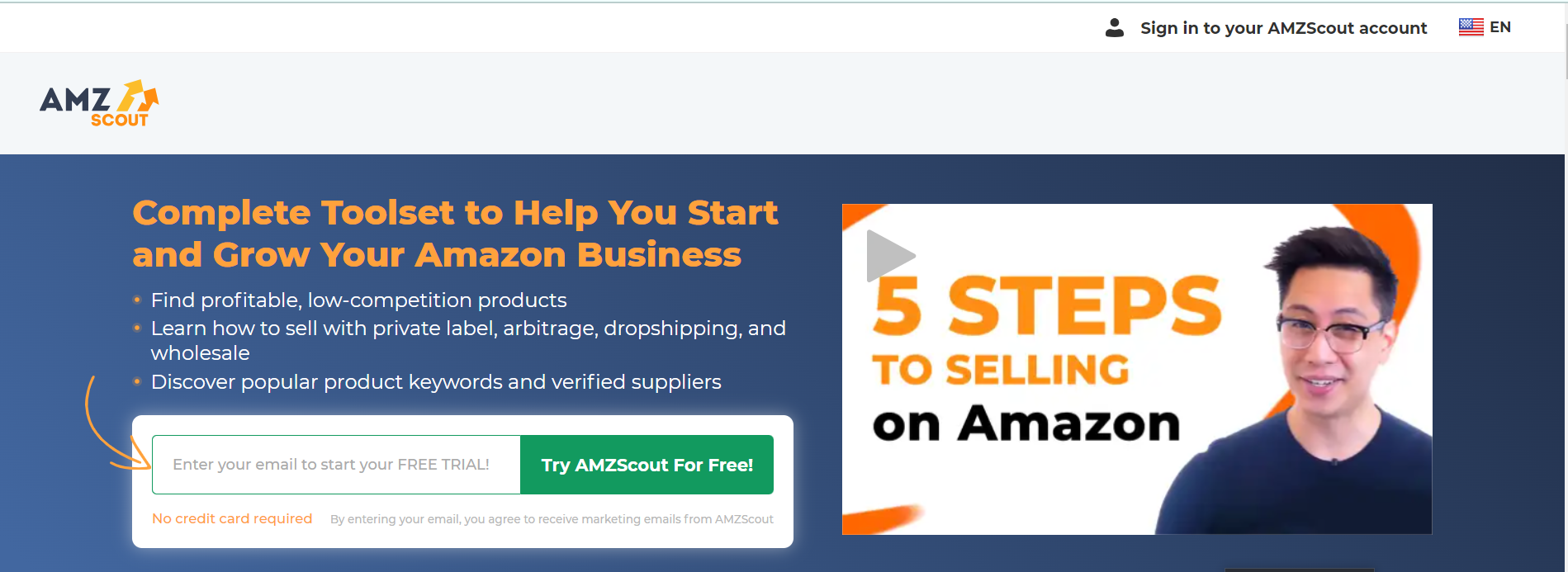
Viral Launch:
Viral Launch offers a suite of tools for Amazon sellers, including a keyword research tool.
It provides search volume, competition, and opportunity scores for keywords, helping sellers identify profitable keywords to target.
Viral Launch also offers features for product research, listing optimization, and sales estimation.
Pros:
- Offers a range of tools for product research, listing optimization, and launch strategies.
- Provides accurate sales estimates and historical data.
- Keyword research capabilities.
- Training and educational resources.
Cons:
- Higher pricing for some sellers.

Sellics:
Sellics is an all-in-one Amazon seller software that includes a keyword research tool.
It provides keyword analytics, search volume, and competition data to help sellers optimize their listings and PPC campaigns.
Sellics also offers features for product research, competitor monitoring, and advertising management.
Pros:
- A comprehensive suite of tools for sales analytics, PPC management, and product research.
- Provides data-driven insights to optimize listings and increase sales.
- Keyword research capabilities.
- Offers a free trial for new users.
Cons:
- Pricing may be higher for certain sellers.
- Some users find the interface complex.
MerchantWords:
MerchantWords is a dedicated keyword research tool meticulously created to meet the precise requirements of Amazon sellers.
It provides search volume data and keyword suggestions based on Amazon’s search queries.
With MerchantWords, sellers can discover relevant keywords and optimize their product listings for better visibility.
Pros:
- Extensive database of Amazon keyword data.
- It helps identify high-volume keywords.
- Offers related keyword suggestions.
- Provides historical search volume data.
Cons:
- Limited features beyond keyword research.
- Pricing may be considered high by some users.
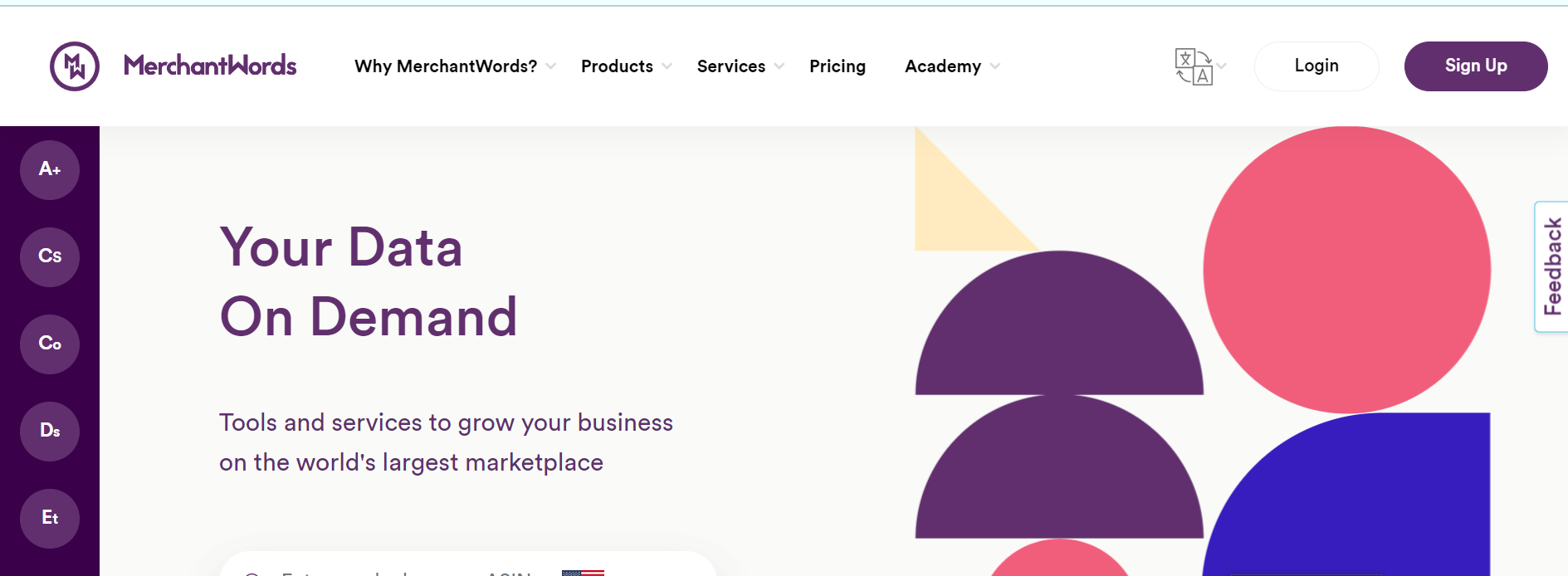
Sonar by Sellics:
Sonar is a free keyword research tool by Sellics. It helps Amazon sellers find relevant keywords and assess their search volumes.
Sonar also provides data on keyword trends, allowing sellers to stay updated on the changing market demands.
Pros:
- Offers free Amazon keyword research tool.
- Provides keyword suggestions and search volume data.
- It helps identify long-tail keywords.
- Integrated with other Sellics tools.
Cons:
- Limited features compared to some other tools.
Keyword Tool Dominator:
Keyword Tool Dominator offers keyword research tools for various platforms, including Amazon.
It provides keyword suggestions and search volume data specific to Amazon’s search queries.
Sellers can discover long-tail keywords and optimize their listings for better visibility.
Pros:
- Provides keyword suggestions for Amazon, Google, and other platforms.
- Offers search volume and competition data.
- Helps identify long-tail keywords.
- Offers a free version with limited features.
Cons:
- Limited features compared to more comprehensive tools.
- Some users may find the interface outdated.
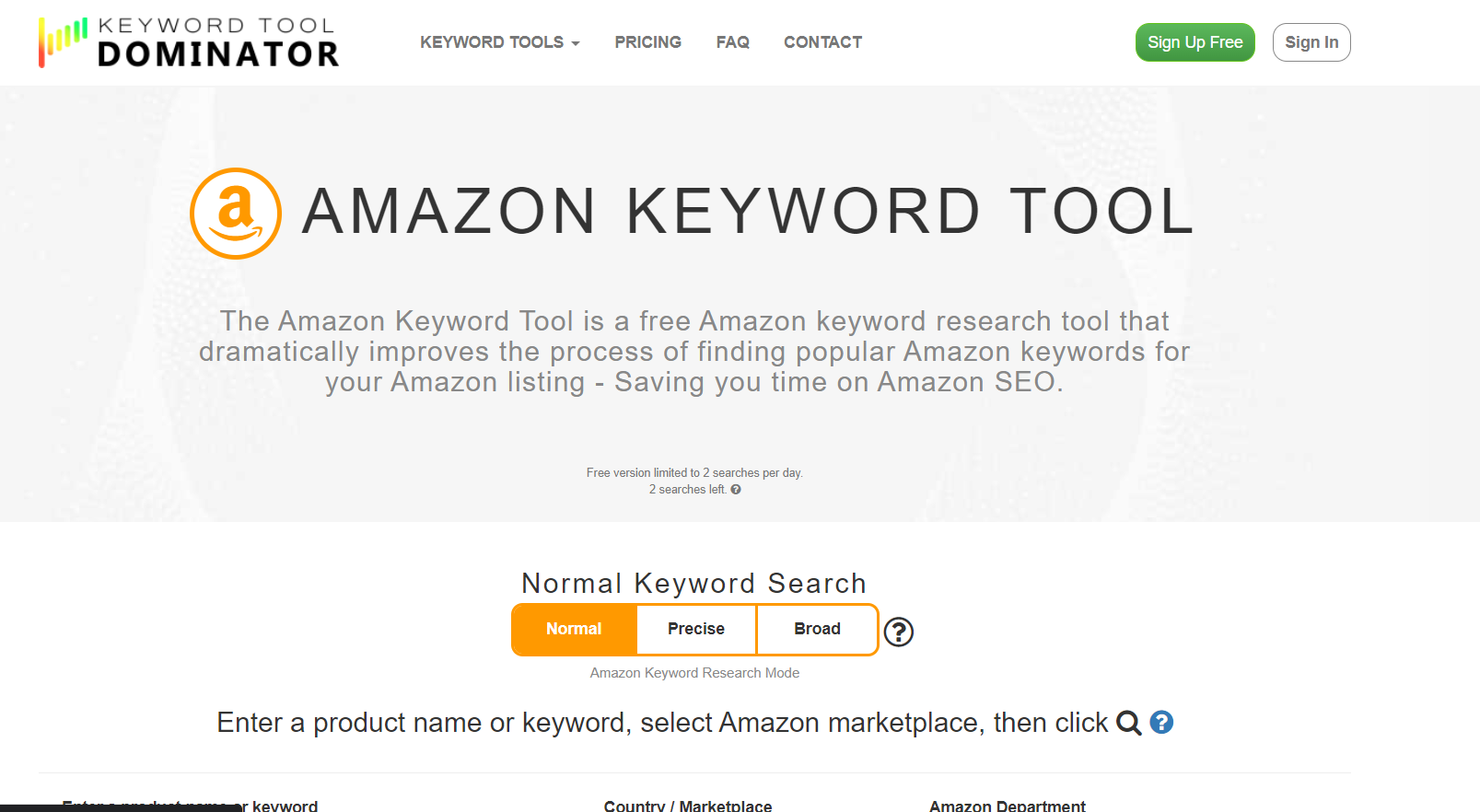
AMZBase:
AMZBase is a free Amazon research tool that includes a keyword research feature.
It provides keyword suggestions and search volume data for Amazon’s marketplaces.
AMZBase also offers features for product research and sales estimation.
Pros:
- Offers product research and tracking capabilities.
- Provides historical sales data and price tracking.
- Helps identify profitable niches and products.
- Chrome extension for real-time data.
Cons:
- Limited features compared to some other tools.
- Pricing may be relatively high.
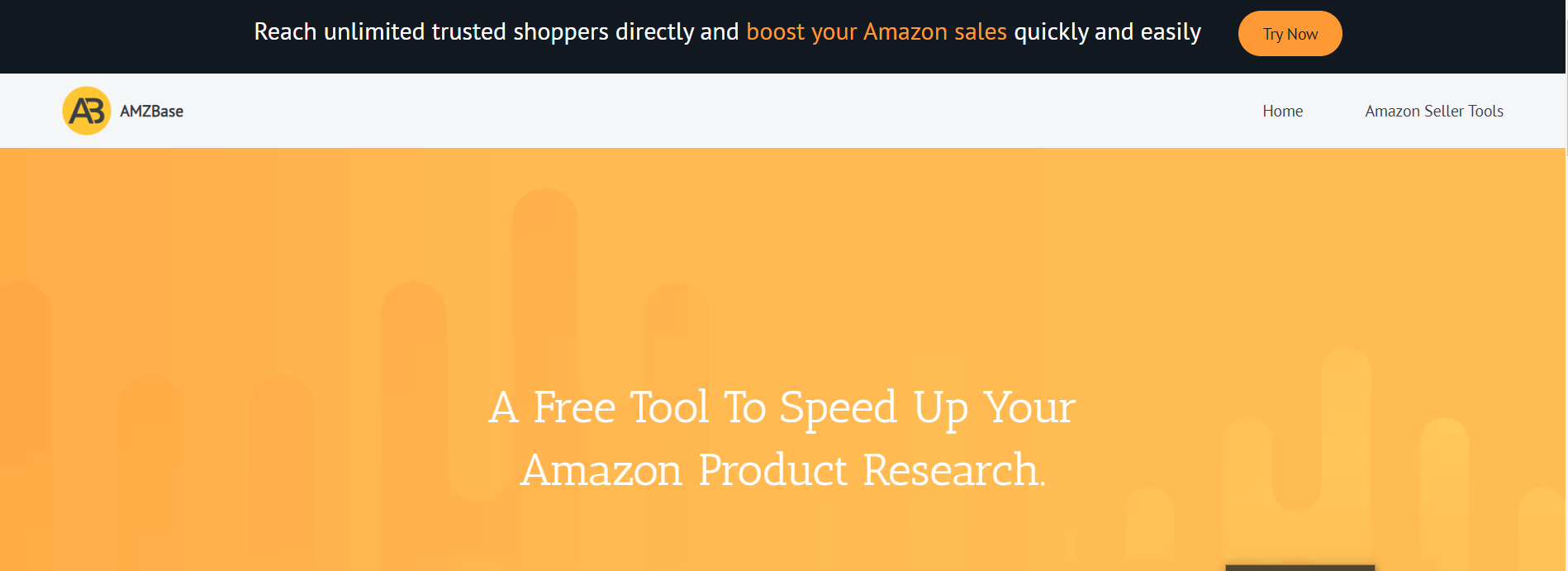
Scope by Seller Labs:
Scope is a keyword research tool by Seller Labs that helps Amazon sellers find relevant keywords for their products.
It provides search volume, competition, and profitability data for keywords. Scope also offers features for product research and listing optimization.
Pros:
- Offers comprehensive keyword research and product analysis.
- Provides accurate sales estimates and historical trends.
- Helps optimize listings and PPC campaigns.
- Integrated with other Seller Labs tools.
Cons:
- Higher pricing for some sellers.
- Some users may find the interface overwhelming.
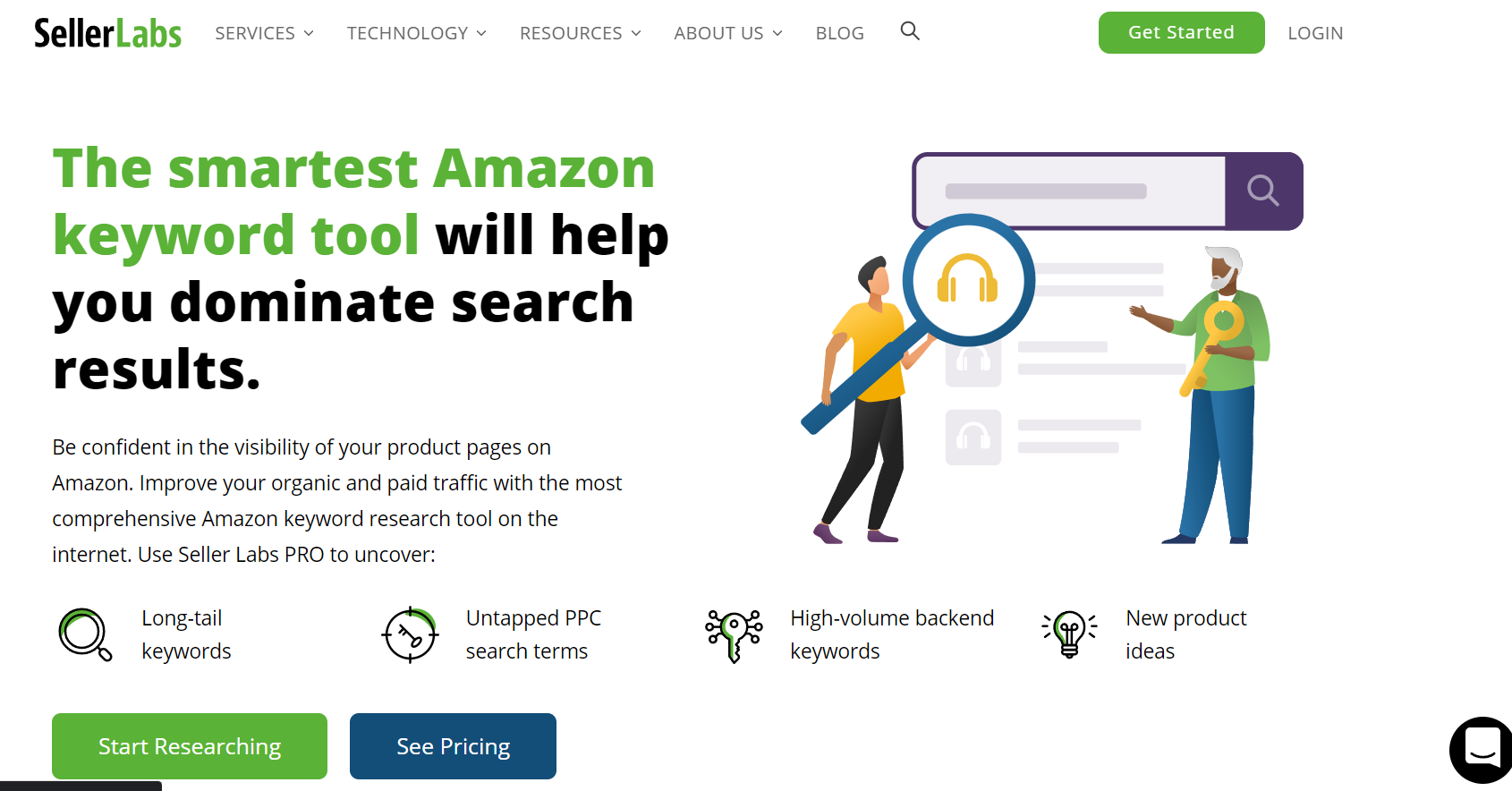
AMZDataStudio:
AMZDataStudio provides a suite of tools for Amazon sellers, including a keyword research tool.
It offers search volume, competition, and opportunity scores for keywords, helping sellers identify profitable keywords to target.
AMZDataStudio also offers features for product research and listing optimization.
Pros:
- Provides keyword research and tracking capabilities.
- Offers product analysis and sales data.
- Helps optimize listings and PPC campaigns.
- Chrome extension for real-time data.
Cons:
- Limited features compared to some other tools.
- Pricing may be relatively high.
Unicorn Smasher:
Unicorn Smasher is a free Amazon product research tool that includes a keyword research feature.
It provides search volume, competition, and revenue estimates for keywords, allowing sellers to discover profitable keywords for their products.
Pros:
- Provides sales estimates, product data, and historical trends.
- Offers comprehensive product research features.
- Chrome extension for on-site research.
- Free version available with limited features.
Cons:
- Some users may find the accuracy of sales estimates questionable.
- Limited features compared to more comprehensive tools.

KeyworX:
KeyworX is an Amazon keyword-tracking tool that helps sellers monitor their keyword rankings.
It provides insights into keyword performance, allowing sellers to track their listing optimization efforts and make necessary adjustments.
These tools vary in terms of features, pricing, and user interface. It’s recommended to explore their websites, reviews, and demos to determine which tool aligns best with your specific needs and budget as an Amazon seller.
Pros:
- Offers keyword tracking and rank monitoring capabilities.
- Provides insights on keyword performance over time.
- Helps optimize listings and monitor competition.
- Offers a free version with limited features.
Cons:
- Limited features compared to more comprehensive tools.

Conclusion
Amazon keyword research tools can be a valuable asset for sellers who want to improve their chances of ranking high in Amazon search results and getting more sales.
When choosing an Amazon keyword research tool, it is important to consider your needs and budget.
Frequently Asked Questions About Amazon Keyword Research Tools
What are Amazon keyword research tools?
There are many different types of Amazon keyword research tools available. Helium 10: Helium 10 is a suite of tools that includes a keyword research tool, a product research tool, and a listing optimization tool.
- Jungle Scout: Jungle Scout is another suite of tools that includes a keyword research tool, a product research tool, and a listing optimization tool.
- Ahrefs: Ahrefs is a SEO tool that includes a keyword research tool that can be used to research keywords for Amazon.
- Semrush: Semrush is another SEO tool that includes a keyword research tool that can be used to research keywords for Amazon.
Types of Amazon keyword research tools
There are two main types of Amazon keyword research tools:
- Free tools: There are a number of free keyword research tools available, such as Google’s Keyword Planner. However, these tools often have limited features and data.
- Paid tools: Paid keyword research tools typically have more features and data than free tools. However, they can be more expensive.
How does Amazon keyword tool work?
An Amazon keyword tool helps sellers find words that people often use when looking for products on Amazon.
These tools analyze a lot of information to show which search terms are popular and how many other sellers are using them.
By using these tools, sellers can find good keywords and make their product listings better. This can help them show up more in searches and get more customers on Amazon.
How to do keyword research for Amazon product?
When conducting keyword research for Amazon products, consider the following steps:
Start with brainstorming:
Begin by brainstorming a list of words and phrases that are relevant to your product. Think about different variations, synonyms, and specific features or benefits.
Use Amazon’s autosuggest feature: Utilize the Amazon search bar and type in relevant keywords related to your product.
Take note of the suggested search terms that appear, as these are popular keywords used by shoppers.
Leverage Amazon keyword research tools:
Utilize keyword research tools specifically designed for Amazon, such as AMZScout, Jungle Scout, or Sonar.
These tools provide insights into search volume, competition, and other metrics to help you identify valuable keywords for your product.
Analyze competitor listings:
Look at the product listings of your competitors who are performing well on Amazon.
Identify the keywords they are targeting and incorporating into their titles, bullet points, and descriptions. This can give you valuable insights into effective keyword usage.
Consider long-tail keywords:
Long-tail keywords are more specific phrases that target niche audiences.
They often have lower search volume but can result in higher conversion rates. Incorporating long-tail keywords relevant to your product can help you reach a more targeted audience.
Evaluate keyword relevancy and competition:
Assess the relevancy of each keyword to your product and its competitiveness.
Find a middle ground between lots of people searching for a keyword and not too many other sellers using it.
Aim for keywords that have decent search volume but are not overly saturated with competition.
Optimize your product listing:
Once you have identified relevant and valuable keywords, incorporate them strategically into your product title, bullet points, product description, and backend search terms.
Make sure your content is well-written and optimized while still providing useful information to potential customers.
How to choose the right Amazon keyword research tool?
When choosing an Amazon keyword research tool, there are a few factors to consider:
- Features: The tool should have the features you need, such as the ability to find long-tail keywords, track keyword trends, and analyze competitor keywords.
- Data: The tool should have access to a large database of keywords and keyword data.
- Price: The tool should be affordable for your budget.
More related Tools:



